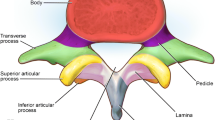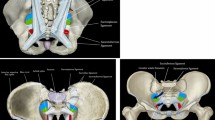Abstract
Objective
Classic anatomical methods have limitations in micro determination of nerve fibre location. Furthermore, the precise detection of the nerve fibres nature is not possible by means of dissection. The combination of immunohistochemistry and three-dimensional reconstruction could be used to resolve these limitations of morphological sciences. Our aim is to describe the evolution of computer-assisted anatomic dissection (CAAD), which is an original method applied to study the distribution of intra-pelvic nerves in anatomic research.
Materials and methods
Serial transverse sectioning of the pelvic region in rabbit, human fetus, infant and adult cadaver was performed. Sections were immuno-histochemically stained and digitized with a high optical resolution scanner. Photoshop 7 software was used in regrouping of the adult cadaver sections then a tri-dimensional reconstruction was achieved using WinSurf software.
Results
The 3D reconstruction of the immuno-histochemically stained histologic sections of the pelvis allowed for precise structural identification of the prostate and its innervations (in fetus, infant and adult). In addition, we reconstructed the entire intra-pelvic organs with accurate demonstration of the location of both adrenergic and cholinergic pathways. Moreover, we performed a virtual dissection of each of the pelvic structures with description of the exact location of the inferior hypogastric plexus, as well as the nature and the distribution of its fibres.
Conclusion
The CAAD is an original method in anatomic research, which illustrates the fact that descriptive anatomy is still a dynamic science. This method allows for a 3D presentation of the intra-organic innervation, the nature of the nerve fibres, and the distribution of receptors and their neurotransmitters. This technique improves the understanding of the complex anatomic regions such as the pelvis from both surgical and educational point of view.





Similar content being viewed by others
References
Alsaid B, Bessede T, Karam I et al (2009) Coexistence of adrenergic and cholinergic nerves in the inferior hypogastric plexus: anatomical and immunohistochemical study with 3D reconstruction in human male fetus. J Anat 214(5):645–654
Arango-Toro O, Domenech-Mateu JM (1993) Development of the pelvic plexus in human embryos and fetuses and its relationship with the pelvic viscera. Eur J Morphol 31(3):193–208
Benoit G, Droupy S, Quillard J et al (1999) Supra and infralevator neurovascular pathways to the penile corpora cavernosa. J Anat 195(4):605–615
Benoit G, Merlaud L, Meduri G et al (1994) Anatomy of the prostatic nerves. Surg Radiol Anat 16(1):23–29
Benoit G, Quillard J, Ledroux X et al (1990) Computer-assisted prostate reconstruction. Ann Urol (Paris) 24(7):585–587
Born G (1883) Die platten modellir methode. Arch Mikrosk Anat 22:584–599
Brandt SS, Ziese U (2006) Automatic TEM image alignment by trifocal geometry. J Microsc 222(1):1–14
Bussolati G, Marchio C, Volante M (2005) Tissue arrays as fiducial markers for section alignment in 3-D reconstruction technology. J Cell Mol Med 9(2):438–445
Colombel M, Droupy S, Paradis V et al (1999) Caverno-pudendal nervous communicating branches in the penile hilum. Surg Radiol Anat 21(4):273–276
Eihe E, Tao-Cheng JH, Schafer MK et al (1996) Visualization of the vesicular acetylcholine transporter in cholinergic nerve terminals and its targeting to a specific population of small synaptic vesicles. Proc Natl Acad Sci USA 93(8):3547–3552
Flynn AA, Pedley RB, Green AJ et al (2001) Optimizing radioimmunotherapy by matching dose distribution with tumor structure using 3D reconstructions of serial images. Cancer Biother Radiopharm 16(5):391–400
Fritsch H (1989) Topography of the pelvic autonomic nerves in human fetuses between 21–29 weeks of gestation. Anat Embryol (Berl) 180(1):57–64
Gibbins IL, Furness JB, Costa M et al (1985) Co-localization of calcitonin gene-related peptide-like immunoreactivity with substance P in cutaneous, vascular and visceral sensory neurons of guinea pigs. Neurosci Lett 57(2):125–130
Hounnou GM, Uhl JF, Plaisant O et al (2003) Morphometry by computerized three-dimensional reconstruction of the hypogastric plexus of a human fetus. Surg Radiol Anat 25(1):21–31
Karam I, Droupy S, Abd-Alsamad I et al (2005) The precise location and nature of the nerves to the male human urethra: histological and immunohistochemical studies with three-dimensional reconstruction. Eur Urol 48(5):858–864
Karam I, Droupy S, Abd-Alsamad I et al (2005) Innervation of the female human urethral sphincter: 3D reconstruction of immunohistochemical studies in the fetus. Eur Urol 47(5):627–633
Kim NK, Aahn TW, Park JK et al (2002) Assessment of sexual and voiding function after total mesorectal excision with pelvic autonomic nerve preservation in males with rectal cancer. Dis Colon Rectum 45(9):1178–1185
Kinugasa Y, Murakami G, Uchimoto K et al (2006) Operating behind Denonvilliers’ fascia for reliable preservation of urogenital autonomic nerves in total mesorectal excision: a histologic study using cadaveric specimens, including a surgical experiment using fresh cadaveric models. Dis Colon Rectum 49(7):1024–1032
Kinugasa Y, Murakami G, Suzuki D et al (2007) Histological identification of fascial structures posterolateral to the rectum. Br J Surg 94(5):620–626
Krantz KE (1959) Innervation of the human uterus. Ann N Y Acad Sci 75:770–784
Lepor H, Gregerman M, Crosby R et al (1985) Precise localization of the autonomic nerves from the pelvic plexus to the corpora cavernosa: a detailed anatomical study of the adult male pelvis. J Urol 133(2):207–212
Lewis DA, Campbell MJ, Foote SL et al (1987) The distribution of tyrosine hydroxylase-immunoreactive fibers in primate neocortex is widespread but regionally specific. J Neurosci 7(1):279–290
Lu W, Huang Q, Ku G et al (2010) Photoacoustic imaging of living mouse brain vasculature using hollow gold nanospheres. Biomaterials 31(9):2617–2626
Margolis G, Pickett JP (1956) New applications of the Luxol fast blue myelin stain. Lab Invest 5(6):459–474
Marks LB, Bentel G, Light K et al (2000) Routine 3D treatment planning: opportunities, challenges, and hazards. Oncology (Williston Park) 14(8):1191–1201
Mauroy B, Demondion X, Drizenko A et al (2003) The inferior hypogastric plexus (pelvic plexus): its importance in neural preservation techniques. Surg Radiol Anat 25(1):6–15
Mutter D, Dallemagne B, Bailey C et al (2009) 3D virtual reality and selective vascular control for laparoscopic left hepatic lobectomy. Surg Endosc 23(2):432–435
Ozdemir MB, Eskicorapci SY, Baydar DE et al (2007) A cadaveric histological investigation of the prostate with three-dimensional reconstruction for better results in continence and erectile function after radical prostatectomy. Prostate Cancer Prostatic Dis 10(1):77–81
Pick J (1970) The autonomic nervous system: morphological, comparitive, clinical, and surgical aspects. J.B. Lippincott
Schaefer HJ (1957) A rapid trichrome stain of Masson type. Am J Clin Pathol 28(6):646–647
Sievert KD, Hennenlotter J, Laible I et al (2008) The periprostatic autonomic nerves–bundle or layer? Eur Urol 54(5):1109–1116
Soler L, Delingette H, Malandain G et al (2000) An automatic virtual patient reconstruction from CT-scans for hepatic surgical planning. Stud Health Technol Inform 70:316–322
Stanford JL, Feng Z, Hamilton AS et al (2000) Urinary and sexual function after radical prostatectomy for clinically localized prostate cancer: the Prostate Cancer Outcomes Study. JAMA 283(3):354–360
Stefansson K, Wollmann RL, Moore BW (1982) Distribution of S-100 protein outside the central nervous system. Brain Res 234(2):309–317
Strasser H, Bartsch G (2000) Anatomy and innervation of the rhabdosphincter of the male urethra. Semin Urol Oncol 18(1):2–8
Streicher J, Weninger WJ, Muller GB (1997) External marker-based automatic congruencing: a new method of 3D reconstruction from serial sections. Anat Rec 248(4):583–602
Su LM, Vagvolgyi BP, Agarwal R et al (2009) Augmented reality during robot-assisted laparoscopic partial nephrectomy: toward real-time 3D-CT to stereoscopic video registration. Urology 73(4):896–900
Uhl JF, Park JS, Chung MS et al (2006) Three-dimensional reconstruction of urogenital tract from Visible Korean Human. Anat Rec A Discov Mol Cell Evol Biol 288(8):893–899
Uhl JF, Plaisant O, Ami O et al (2006) 3D modeling in the field of morphology: methods, interest and results. Morphologie 90(288):5–20
Usdin TB, Eiden LE, Bonner TI et al (1995) Molecular biology of the vesicular ACh transporter. Trends Neurosci 18(5):218–224
Wallner C, Dabhoiwala NF, Deruiter MC et al (2008) The Anatomical Components of Urinary Continence. Eur Urol 54(5):1136–1142
Walsh PC, Brendler CB, Chang T et al (1990) Preservation of sexual function in men during radical pelvic surgery. Md Med J 39(4):389–393
Yucel S, Baskin LS (2003) Identification of communicating branches among the dorsal, perineal and cavernous nerves of the penis. J Urol 170(1):153–158
Conflict of interest
None of the authors has any financial or personal relationship with other people or organisations that might have influenced the present work.
Author information
Authors and Affiliations
Corresponding author
Rights and permissions
About this article
Cite this article
Alsaid, B., Bessede, T., Diallo, D. et al. Computer-assisted anatomic dissection (CAAD): evolution, methodology and application in intra-pelvic innervation study. Surg Radiol Anat 34, 721–729 (2012). https://doi.org/10.1007/s00276-011-0855-1
Received:
Accepted:
Published:
Issue Date:
DOI: https://doi.org/10.1007/s00276-011-0855-1




